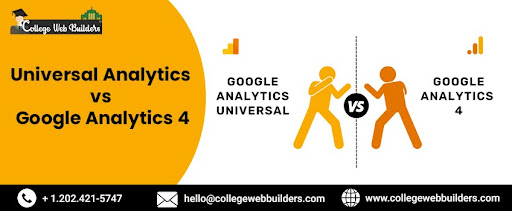
Universal Analytics vs Google Analytics 4
In the world of digital marketing and website optimization, analytics play a crucial role in understanding user behavior, measuring the effectiveness of marketing campaigns, and driving data-informed decision-making. Google Analytics has long been the go-to solution for many businesses, providing valuable insights into website performance. However, with the introduction of Google Analytics 4 (GA4), a new era of analytics has emerged. This article by our digital marketing company aims to explore the key differences between Universal Analytics (UA) and Google Analytics 4, highlighting the evolution and benefits of the newer version.
1) The Evolution of Google Analytics:
Google Analytics has been the industry standard for web analytics since its launch in 2005. Universal Analytics, introduced in 2012, became the widely adopted version by digital marketing services and provided valuable insights into website traffic, conversions, and user behavior. However, as the digital landscape evolved and user interactions expanded beyond traditional websites to mobile apps, IoT devices, and offline channels, a new approach to analytics was needed. This led to the development of Google Analytics 4.
2) Data Collection and Tracking:
One of the significant differences between UA and GA4 lies in the way data is collected and tracked. Universal Analytics relies heavily on cookies and client IDs to gather information about user interactions. While this approach has been effective for websites, it faces challenges with the rise of privacy regulations and the increasing use of ad blockers. In contrast, GA4 utilizes an event-driven data model that captures user interactions, allowing for more comprehensive tracking across multiple platforms, including websites, apps, and offline channels. This event-based tracking enables businesses to gain a deeper understanding of user behavior, even in the absence of cookies.
3) User-Centric Approach:
GA4 introduces a user-centric approach to analytics, shifting the focus from individual sessions to the user journey as a whole. In Universal Analytics, each session is treated as a separate entity, making it challenging to track users across multiple devices or touchpoints. GA4, on the other hand, uses a persistent user ID that enables businesses to understand how users engage with their brand across various channels and devices. This holistic view of the user journey helps identify opportunities for optimization and personalization, ultimately improving the overall user experience.
4) AI-Driven Insights:
Google Analytics 4 incorporates advanced machine learning and artificial intelligence capabilities to provide more meaningful insights. With UA, businesses often need to manually set up goals, funnels, and custom reports to extract valuable information. GA4, powered by Google's machine learning algorithms, automatically detects and surfaces key insights, making it easier for businesses to uncover trends, patterns, and opportunities. The AI-driven insights in GA4 allow marketers to focus on strategic decision-making rather than spending excessive time on data analysis.
5) Enhanced Event Tracking:
Event tracking has significantly improved in GA4 compared to Universal Analytics. While UA focuses primarily on pageviews, events in GA4 can capture a wide range of interactions, including clicks, video views, file downloads, scroll depth, and more. This enhanced event tracking empowers businesses to measure specific user actions and engagement points that align with their unique goals. The flexibility of event tracking in GA4 allows for greater customization and empowers businesses to gain granular insights into user behavior.
6) Cross-Domain Tracking:
Tracking users for a digital marketing agency across multiple domains or subdomains has been a challenge in Universal Analytics. GA4 addresses this limitation by providing built-in cross-domain tracking. This feature enables businesses to understand the entire user journey, even if it involves navigating across different websites or platforms. By consolidating data from various domains, GA4 offers a more comprehensive view of user behavior and conversion paths, leading to more accurate attribution and better optimization opportunities.
7) Privacy and Consent:
As privacy concerns continue to shape the digital landscape, GA 4 places a greater emphasis on privacy and data protection. While Universal Analytics heavily relies on third-party cookies, GA4's event-driven model allows for data collection even in cookie-restricted environments. This ensures that businesses can still gather valuable insights while respecting user privacy preferences. Additionally, GA4 provides tools and features to assist businesses in complying with privacy regulations and obtaining user consent, fostering a more transparent and privacy-focused analytics approach.
8) Transitioning to GA4:
With the introduction of GA4, Google has made it clear that it is the future of analytics. While Universal Analytics continues to be supported, Google recommends that businesses start implementing GA4 to take advantage of its advanced features and insights. Transitioning from UA to GA4 requires careful planning, including updating tracking codes, setting up event tracking, and redefining goals and metrics. However, the benefits of GA4, such as cross-platform tracking, AI-driven insights, and privacy enhancements, make it a compelling choice for businesses looking to stay ahead in the rapidly evolving digital landscape.
Scope of Universal Analytics Vs. Google Analytics 4
Scope of Universal Analytics
1) Website Analytics: Universal Analytics primarily focuses on website analytics and provides insights into website performance, user behavior, conversions, and marketing effectiveness.
2) Cookie-Based Tracking: It heavily relies on cookies and client IDs for data collection and tracking user interactions on websites.
3) Customization: Universal Analytics offers a high level of customization through the use of custom dimensions, metrics, and goals, allowing businesses to track specific metrics tailored to their needs.
4) Third-Party Integrations: It integrates with various third-party tools and platforms, enabling businesses to combine data from multiple sources for more comprehensive analysis.
5) Ecommerce Tracking: Universal Analytics provides robust e-commerce tracking capabilities, allowing businesses to monitor sales, transactions, and revenue generated from their online stores.
Scope of Google Analytics 4
1) Cross-Platform Tracking: Google Analytics 4 expands its scope beyond websites and includes tracking and analysis of mobile apps, IoT devices, and offline channels. It provides a more comprehensive view of user interactions across multiple platforms.
2) Event-Driven Model: GA4 adopts an event-driven data model, enabling businesses to track a wide range of user interactions, including clicks, video views, file downloads, scroll depth, and more. This allows for more granular and detailed tracking of user behavior.
3) User-Centric Analysis: GA4 takes a user-centric approach, focusing on the user journey as a whole rather than individual sessions. It uses a persistent user ID to track users across different devices and touchpoints, providing a more holistic view of user engagement.
4) AI-Driven Insights: Google Analytics 4 incorporates advanced machine learning and AI capabilities to automatically detect patterns, trends, and insights from the data. It provides pre-built AI models and reports, making it easier for businesses to gain actionable insights without extensive manual analysis.
5) Privacy and Consent: GA4 addresses privacy concerns by reducing reliance on third-party cookies and providing options for businesses to comply with privacy regulations. It offers tools for data consent management and allows businesses to respect user preferences while still gathering valuable insights.
Conclusion
In conclusion, Google Analytics 4 represents a significant evolution in web analytics, offering businesses a more comprehensive and user-centric approach to understanding their audience. With advanced tracking capabilities, AI-driven insights, cross-platform tracking, and privacy enhancements, GA4 provides a powerful toolkit for businesses to make data-informed decisions and optimize their online presence. While Universal Analytics still serves as a solid foundation, transitioning to GA4 is a step towards embracing the future of analytics and staying competitive in the ever-changing digital world. For more information or to avail services of our best digital marketing company in Ashburn USA, visit Collegewebbuilders.com .
- Tags: Marketing, Onlline, Internet





